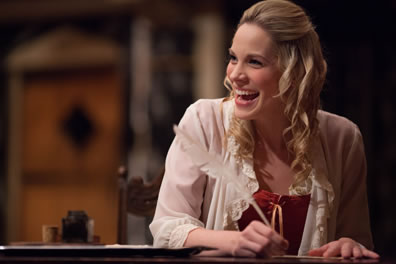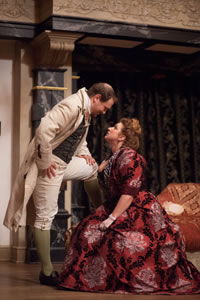The Country Wife
Original Wit and Corps de Excellence
Wins the Play by a Country Smile
By William Wycherley
American Shakespeare Center, Blackfriars Playhouse, Staunton, Va.
Saturday, February 2, 2013, C–6&7 (center stalls)
Actors' Renaissance Season
Directors, take heed. You could become an extinct species.

Margery Pinchwife (Tracie Thomason) writes her letter to Horner in the American Shakespeare Center production of The Country Wife at the Blackfriars Playhouse. Below, Horner (Benjamin Curns) and Lady Fidget (Allison Glenzer. Photos by Lauren D. Rogers, American Shakespeare Center.
In The Country Wife, the just-this-side-of-explicit bawdy Restoration comedy by William Wycherley, the troupe of 12 actors in the American Shakespeare Center's Actors' Renaissance Season put together consistent costuming, complex blocking, choreographed scene changes, and thematic musical interludes while molding the crazy antics of their individual characters into one ensemble-strong performance all on their own. Oh, and all this with just 20 hours of rehearsal. The first time these actors ran through the entire play was in the first public preview. The performance we saw occurred just a week later, and it was as tight and well-oiled, if not better, as productions that run for months on Broadway.
This is funny stuff as written, and funnier as acted by this conclave of skilled comic actors. They turn what could easily have been a stagey period piece into something with the spirit of a kegger. As we watch the sexcapades of various characters, our delighted shock comes not only from the crystal-clear innuendo in the script but the fact that the winking language is understandable to us in our time and the farcical plots have a 21st century sensibility (or insensibility, if you will) despite the play's 17th century composition and conventions and the troupe playing it in those conventions.
The main character, Harry Horner (Wycherley was none-too-subtle in his choice of character names), plants a rumor that he has returned from a sojourn in France as a eunuch. This, he reasons—correctly—will give him access to wives at all hours of the day and night without their honors being tainted. The status of his manhood—or lack thereof—doesn't concern him at all. For one thing, he's rich enough to continue moving easily through the upper-class party scene. More importantly, while other men may show discomfort with his condition—Daniel Kennedy as Sir Jasper Fidget gives knowing nods to every mention of France, and the many times he speaks the word "eunuch" he puts his hand to his mouth as if to waylay the damning word he just can't help pronouncing—they also gladly endorse the idea that their wives should keep him company. (When I was in high school in the early '70s, two guys took a home economics class, leading to much snickering among us other guys, until we all realized the two were scoring with the girls—so, yes, this play translates to our times quite appropriately.) By play's end, every woman knows Horner's secret and even knows that the other women are taking advantage of that secret, too. No matter. As Horner points out to Lady Fidget (Allison Glenzer, ever-wavering between musty wife and lusty lover) when she fears that the secret will get out and thereby prejudice her honor, "Nay, madam, rather than they shall prejudice your honor, I'll prejudice theirs; and to serve you, I'll lie with 'em all, make the secret their own, and then they'll keep it."
Wycherley, the witty observer of upper-class hypocrisy, predates George Bernard Shaw and Oscar Wilde by more than 200 years, but he writes with none of the Victorian fetters of decency that Shaw and Wilde labored under. Whereas Wilde regards a misplaced correspondence as the subject for scandal, Wycherley's characters openly strategize extramarital sexual rendezvous and then carry them out just off stage. Like his 19th century successors, though, Wycherley takes time to drop in some self-revealing society truths via witty repartee. "Your arrantest cheat is your trustee or executor; your jealous man, the greatest cuckold; your churchman, the greatest atheist; and your noisy, pert rogue of a wit, the greatest fop, dullest ass, and worst company," Horner says.
The comparison of Wycherley and Wilde as playwrights is reflected in the acting in this production. Benjamin Curns plays Horner with a sly smile for the other characters and a twinkle in his eye for us. He and René Thornton Jr., playing Quack the doctor who helps Horner carry out his conspiracy, pair up in the same manner as the two actors did a couple of years ago playing, respectively, Algernon and Jack on this stage in Wilde's The Importance of Being Earnest, sledding through their lines with casual wittiness.
Into this London sexual-social scene comes the naïve title character, Margery Pinchwife (Tracie Thomason), whose husband (John Harrell) doesn't know about Horner's supposed condition but does know the proclivities of pre-France Horner as well as of the other gallants, so he intends to keep his wife shut away. However, the laws of nature dictate that denial breeds desire, so Margery naturally wants to take part in the society that Pinchwife unwittingly reveals to her via his jealous demands. She even maneuvers in her innocent way to hook up with Horner (the joke here is not just that husbands and wives of upper-class society accept the inevitability of extramarital affairs but that the country bumpkin wife considers loving someone other than her husband as a natural condition to be freely acted upon).
 Harrell has played many a curmudgeon and sniveling evildoer on the Blackfriars stage, but he does so with such charm that we end up laughing at more than loathing his characters, and such is the case with Pinchwife. When he forces his wife to write a letter, under his dictation, breaking off with Horner, she protests that his salutation of "Sir" should be "Dear Sir." "Write as I bid you, or I will write 'whore' with this penknife in your face," he replies, and Harrell speaks these harsh words with threatening authority. People in the audience react with vocal discomfort, whereupon Harrell shushes them with, "Oh, come on," re-instating the scene's comic groove. The scene reaches its comic climax courtesy of Thomason, who plays Margery with perpetual wide-eyed wonder and an utter lack of inhibition. After Pinchwife has left the room, Margery replaces his dictated letter to Horner by writing one of her own, and Thomason turns the mere act of writing a letter into an orgasmic experience.
Harrell has played many a curmudgeon and sniveling evildoer on the Blackfriars stage, but he does so with such charm that we end up laughing at more than loathing his characters, and such is the case with Pinchwife. When he forces his wife to write a letter, under his dictation, breaking off with Horner, she protests that his salutation of "Sir" should be "Dear Sir." "Write as I bid you, or I will write 'whore' with this penknife in your face," he replies, and Harrell speaks these harsh words with threatening authority. People in the audience react with vocal discomfort, whereupon Harrell shushes them with, "Oh, come on," re-instating the scene's comic groove. The scene reaches its comic climax courtesy of Thomason, who plays Margery with perpetual wide-eyed wonder and an utter lack of inhibition. After Pinchwife has left the room, Margery replaces his dictated letter to Horner by writing one of her own, and Thomason turns the mere act of writing a letter into an orgasmic experience.
Pinchwife's opposite in jealousy is the fop Sparkish (Chris Johnston), engaged to Pinchwife's sister, Alithea (Abbi Hawk). He is so far from jealousy that he blithely assists his friend, Harcourt (Grant Davis), in courting Alithea even on the eve of the wedding. To highlight any individual in this superb acting corps would seem to slight the rest, but Johnston does a star-stealing turn as Sparkish. The energy he brings to his foppery is unceasing, his affectations in manner consistently funny, but he's never so over-the-top as to become tiresome. The play-long joke for Sparkish is how his so-called friends tolerate him only because he is oblivious to their abuse of him—similar to how the king and lords of Navarre regard Don Armado in Shakespeare's Love's Labour's Lost—but Johnston manages to bring a heroic tinge to Sparkish's ridiculousness.
Interestingly, the play has only one serious moment of violence, and it is at the tip of Sparkish's sword when he shows a sudden, furious but noble flash of honor-grounded will. Johnston's wide range of emotion over the course of these few seconds is arrestingly believable. This is the same guy who, in the musical preshow, does a spot-on Prince in voice and movement singing "Kiss." Prior to this season, Johnston has played 79 roles in 48 productions at the Blackfriars (on top of his all-encompassing musical skills ranging from banjo to trumpet), and while most of those roles have been secondary characters, he is always solid, and he played a multidimensional Claudio in the 2012 Renaissance Season's Much Ado About Nothing. It's time we see him make a run at Hamlet and the like in coming seasons.
"Your bigots in honor are just like those in religion. They fear the eye of the world more than the eye of heaven," Horner says to Quack, explaining how he can operate so easily as a "Machiavel in love." His plan is foolproof, he earlier notes to Lady Fidget, because "the reputation of impotency is as hardly recovered again in the world as that of cowardice." Such truisms are timeless. And so is this production. Mounted in so short a time, it will play into the perpetuity of your memory.
Eric Minton
February 7, 2013
Comment: e-mail editorial@shakespeareances.com
Start a discussion in the Bardroom



 Find additional Shakespeareances
Find additional Shakespeareances